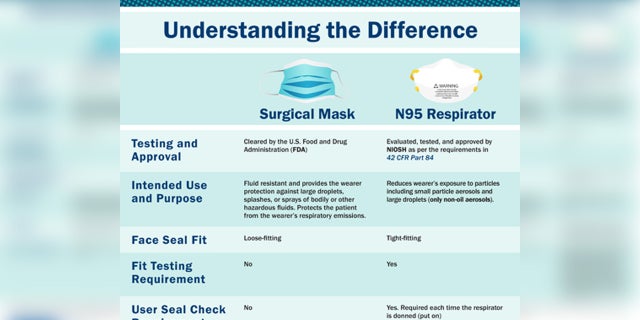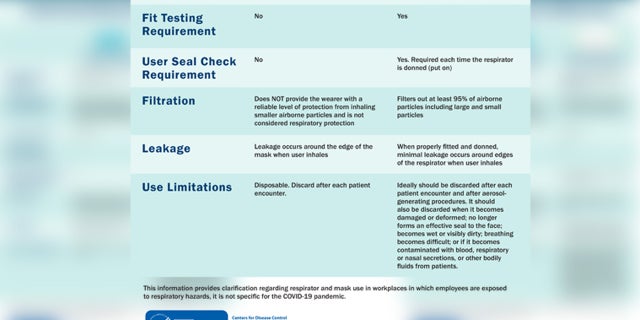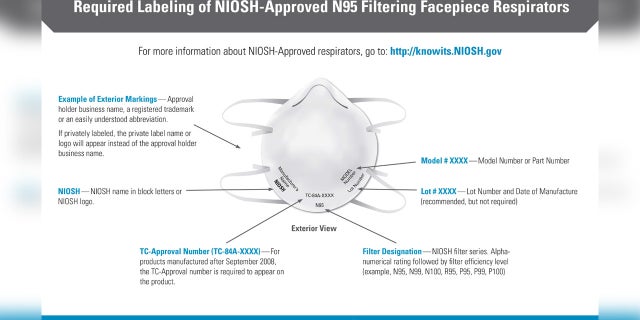In light of the current world-wide infectious-disease outbreak, the Centers for Disease Control and Prevention (CDC) is considering changing its mask guidelines for the general public to wear N95 or KN95 masks rather than cloth masks if they can tolerate wearing them consistently, according to a recent report.
CDC Director rochelle-walensky” target=”_blank”>Dr. Rochelle Walensky<
She noted, however, ” … we are preparing an update to the information on our mask website. … And we want to provide Americans the best and most updated information to choose what mask is going to be right for them.”
The 2020 CDC guidance to wear only cloth masks was originally based on concern that N95 masks were in too short supply, but this is no longer a concern, the report noted.
The CDC currently recommends the general public to wear cloth masks that have two layers of breathable fabric that covers the mouth and nose completely, fits snugly with a nose wire to prevent air leaking from the top, while N95 masks should be reserved for only health care workers.
But Michael Osterholm, who leads the University of Minnesota’s Center for Infectious Disease Research and Policy, disagrees: “That note of trying to save N95s for health-care workers is just grossly out of date.”

Understanding the Difference: Centers for Disease Control and Prevention National Institute for Occupational Safety and Health

Understanding the Difference: Centers for Disease Control and Prevention National Institute for Occupational Safety and Health
A recent study discovered there were a wide range in the pore size of 20 cloth masks studied, ranging from 80 to 500 micrometers, but the size of a COVID-19 particle is only 0.12 micrometers, suggesting why some health experts argue for masks that have higher filtration standards.
N95 masks, which are approved by the National Institute for Occupational Safety and Health, filter up to 95% air particles, but they have some disadvantages in comparison to cloth masks, including some find it harder to breathe in, the masks can’t be washed, they are more expensive and need to be thrown away when they become soiled or damaged, according to the CDC.
KN95 masks filter up to 95% of air particles while KF94 masks filter up to 94% of air particles, but they only certified in China and South Korea, respectively, with the CDC warning 60% of KN95 masks sold in the United States are counterfeit. N95 masks typically have a duckbill shape, KN95 masks are tent-shaped, while KF94 masks are boat-shaped.

N95 Mask: Centers for Disease Control and Prevention National Institute for Occupational Safety and Health
A surgical mask blocks large-particle droplets that may contain wild-nature and wild-nature from reaching the nose or mouth, but “it does not filter or block very small particles in the air that may be transmitted by coughs, sneezes, or certain medical procedures,” according to the Food and Drug Administration, adding: “Surgical masks also do not provide complete protection from germs and other contaminants because of the loose fit between the surface of the mask and your face.”
CDC FACES MORE BACKLASH AFTER NEW REPORTED RECOMMENDATIONS FOR ‘BETTER’ MASKING
But Dr. Monica Gandhi, an infectious-disease” target=”_blank”>infectious<.”
“If everyone is just wearing a cloth mask or just a surgical mask, it won’t make any difference” with the current omicron variant, she added.
According to a CDC report prior to the omicron outbreak, an uninfected person not wearing a mask can be infected within 15 minutes of standing within six feet of someone who is COVID-19 positive who is not wearing a mask.
“Any mask is better than no mask. But cloth masks and then surgical masks are not as good as N95-caliber masks,” said Dr. Ranu Dhillon, a physician at Brigham and Women’s Hospital.
CLICK HERE TO GET THE FOX NEWS APP
Click here for the current CDC guidance on how to select, wear, and clean masks to prevent COVID-19.
 Iktodaypk Latest international news, sport and comment
Iktodaypk Latest international news, sport and comment




